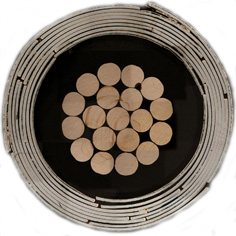As published by the University of Colorado Technology Transfer Office:
Advanced Conductor Technologies to develop CU high performance superconducting cable technology.
Thinner, more versatile superconducting cables have potential for high-energy density power transmission, high-field magnets and energy storage.
BOULDER, Colo., July 18, 2012 – Advanced Conductor Technologies LLC and the University of Colorado recently completed an exclusive option agreement to allow Advanced Conductor Technologies to develop high-temperature superconducting cables that could be an enabling technology for high-current, dc power transmission and for the next generation of high-field magnets.

The technology portfolio covered by the option was developed by Danko van der Laan, a physicist with appointments at CU-Boulder and the National Institute of Standards and Technology (NIST). High-temperature superconducting (HTS) cables were initially developed for metropolitan electrical networks because of their economy, reliability, and large transmission capacity. Van der Laan has developed a technique to make thinner, more flexible HTS cables that can carry the same (or greater) current. These more-compact cables have immediate applications in electrical grids and scientific and medical equipment; they may also enable HTS power transmission for military applications.
Looking forward, this technique opens the door to new markets that require flexible, high-current density power transmission cables, and also has potential for superconducting transformers, generators, and magnetic energy storage devices. “The exclusive option agreement with CU is an important step for my company to develop what are now called conductor on round core (CORC) cables,” says van der Laan. Within a year of its founding, Advanced Conductor Technologies was awarded three small business grants from the Department of Energy and the Department of Defense; the company is currently commercializing the CORC cables for the next generation of fusion magnets, energy storage magnets for airborne directed energy weapons and high-energy density cables for naval applications. “”Advanced Conductor Technologies is pursuing an aggressive development effort to bring this promising technology to market,” adds Ted Weverka of the CU Technology Transfer Office.
About Advanced Conductor Technologies:
Advanced Conductor Technologies LLC is a new company that focuses on the commercialization of high-temperature superconducting cables using the new cable technology developed by its founder, Danko van der Laan, while at the University of Colorado Boulder and the National Institute of Standards and Technology (NIST). The cable technology opens the door to new markets that require flexible, high-current density power transmission cables. It also forms the basis for the first practical superconducting cable for high-field magnets that operate at magnetic fields above 20 Tesla, or at temperatures exceeding 20 Kelvin.
About the Technology Transfer Office and the University of Colorado:
The CU Technology Transfer Office (TTO) pursues, protects, packages, and licenses to industry the intellectual property generated from research at CU. The TTO provides assistance to faculty, staff, and students, as well as to businesses looking to license or invest in CU technology. Since 2002, 80 companies have been formed based on CU intellectual property; of these, 65 are operational as either stand-alone or subsidiary/merged companies. For more information about technology transfer at CU, visit www.cu.edu/techtransfer.
The University of Colorado is a premier teaching and research university with four campuses: the University of Colorado at Boulder, the University of Colorado at Colorado Springs, the University of Colorado Denver and the University of Colorado Anschutz Medical Campus. More than 55,000 undergraduate and graduate students are pursuing academic degrees on CU campuses. CU is ranked seventh among public institutions in federal research expenditures in engineering and science by the National Science Foundation. Academic prestige is marked by the university’s four Nobel laureates, seven MacArthur “genius” Fellows, 18 alumni astronauts and 19 Rhodes Scholars. For more information, go to www.cu.edu.
